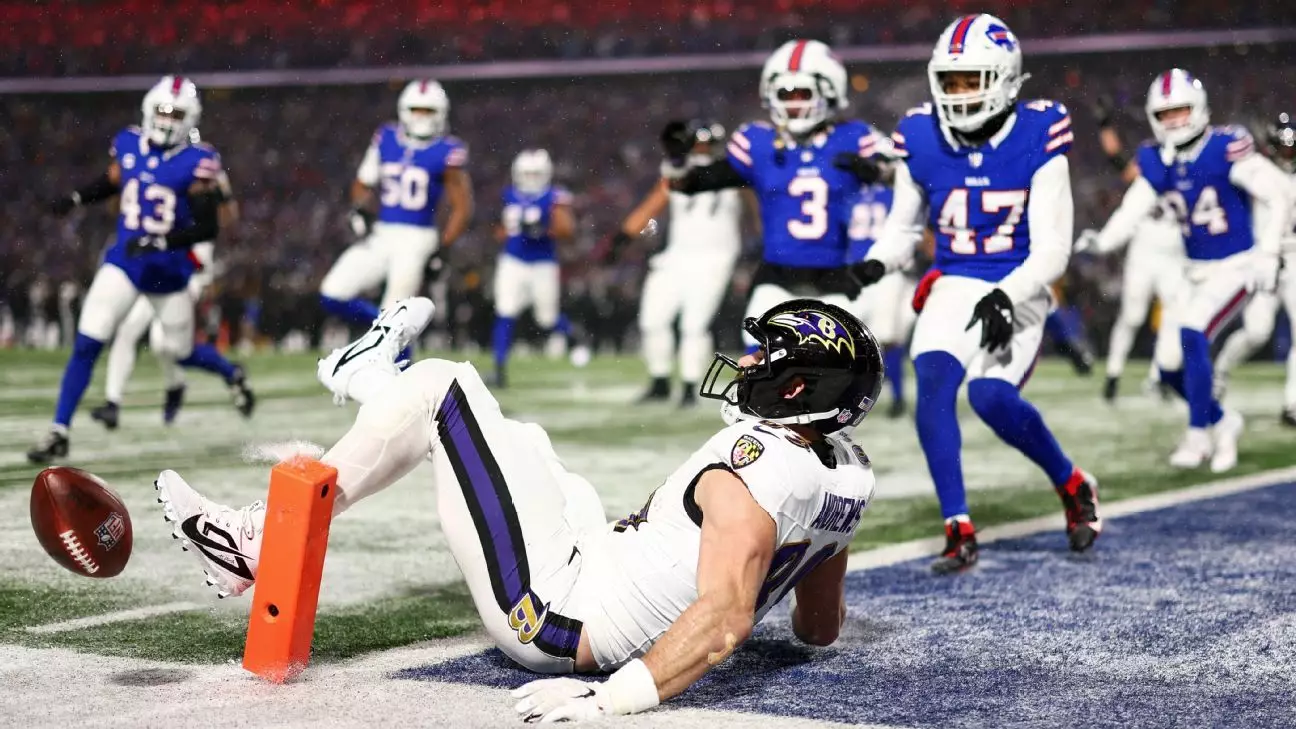Following the Baltimore Ravens’ heart-wrenching 27-25 loss to the Buffalo Bills in the AFC divisional round, the frustrations of quarterback Lamar Jackson were palpable. Instead of simply attributing the defeat to a critical dropped pass by tight end Mark Andrews during a pivotal two-point conversion attempt, Jackson emphasized the more profound issue of turnovers — a theme that has haunted the Ravens throughout the playoffs. His raw emotions, displayed through an unfiltered tirade against the turnovers, encapsulate the sting of lost opportunities, not just for himself but for the entire team.
Jackson acknowledged that while the Ravens exhibited flashes of offensive brilliance — moving the ball down the field effectively — their inability to maintain possession ultimately sealed their fate. His outburst, notable for its candidness and frustration, reflects the weight of expectations that hang over both him and the franchise in their search for postseason success. “We can’t have that s—, and that’s why we lost the game,” Jackson lamented, underscoring the realization that mistakes in critical moments can be catastrophic in playoff scenarios.
In professional sports, particularly in high-stakes playoff games, turnovers can change the outcome of a match in an instant. Jackson’s repeated commentary on the “uncharacteristic” nature of these mistakes illustrates how profoundly they can disrupt momentum and confidence. Throughout this season, Jackson had only thrown four interceptions — a testament to his improved decision-making — yet he opened this game with a pick and later fumbled the ball while scrambling under pressure. Herein lies the paradox: a player who had grown visibly more disciplined struggled to manage the intense pressure of playoff football.
Jackson’s acknowledgment of his own mistakes, coupled with his leadership role, signals a level of accountability that can be both refreshing and necessary in team sports. “I have to protect the ball, so I’m hot,” he stated, revealing an awareness that transcends personal performance; it extends to the responsibility he bears for his team’s collective success.
Mark Andrews, often the focal point of the Ravens’ passing attack, found himself in an unusual position following the game. Two dropped passes, including the crucial 2-point conversion attempt, marked a rare off-day for the typically reliable tight end. Ravens coach John Harbaugh defended Andrews, highlighting not only his contributions throughout the season but the emotional and psychological toll that a single game can extract from a player. “There’s nobody that has more heart and cares more than Mark,” Harbaugh remarked, contributing to a narrative that extends beyond just stats and plays.
Yet, Andrews’ performance raises questions about the mental demands placed on athletes in critical moments. With high expectations placed on him, it’s essential to consider how pressure can weigh heavily on even the most talented individuals. Safety Kyle Hamilton pointed out that mistakes do not define a player — a sentiment echoed across the locker room in an attempt to support their teammate in a moment of vulnerability.
Jackson’s comments regarding teamwork and collective responsibility serve as a reminder of the complex nature of football as a team sport. He made sure to absolve Andrews of singular blame, emphasizing, “All of us played a factor in that game.” This underscores an essential tenet of sports: while individual moments can shift the tide of a game, the outcomes are ultimately derived from the collective effort of the entire team.
In Jackson’s reflection on the loss, his focus on composure and resilience is telling. He reframed the narrative from one of disappointment to a learning opportunity. Rather than wallowing in defeat, the Ravens now face the daunting task of regrouping and refocusing for the next season and the future aspirations of winning a Super Bowl.
As the Ravens’ season comes to a premature end, both Jackson and Andrews must look inward. For Jackson, a quarterback dubbed as “the only multiple NFL MVP award winner not to win a Super Bowl,” the urgency of utilizing this experience as a lesson cannot be overstated. With each playoff exit, the quest for championship success looms larger, and the challenges of managing high expectations continually arise.
The Ravens must now navigate the complexities of their team dynamics, identify areas for improvement, and commence the groundwork for a more successful endeavor next season. Both Jackson and Andrews will likely become even more resolute in their determination to turn the frustrations of this loss into motivation for the future. Only time will tell whether this disappointing exit will catalyze a rejuvenation of their championship aspirations or spiral into a cycle of perpetual near misses.


Leave a Reply